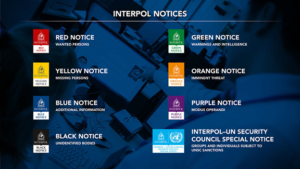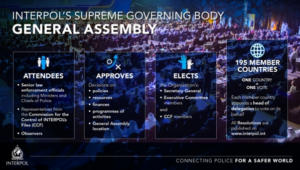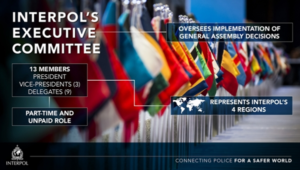Interpol launches first-ever metaverse for law enforcement worldwide
Why in News?
The General Assembly of the International Criminal Police Organisation (Interpol) is meeting in Delhi for four days from October 18, 2022.
- This is the second time since 1997 the 195-member-strong body is holding such a large conference in India.
What is the Interpol?
- It was set up in 1923, as a secure information-sharing platform that facilitates criminal investigation of police forces across the globe through the collection and dissemination of information received from various police forces.
- It is headquartered in Lyon, France.
- It keeps track of the movements of criminals and those under the police radar in various regions and tips off police forces that had either sought Interpol’s assistance or which in its opinion will benefit from the particulars available with it.
- It aims to promote the widest-possible mutual assistance between criminal police forces.
How is the Interpol Organised?
- The head of Interpol is the President who is elected by the General Assembly. He comes from one of the member nations and holds office for four years.
- The day-to-day activities are overseen by a full-time Secretary General elected by the General Assembly, who holds office for five years.
- The General Assembly lays down the policy for execution by its Secretariat which has several specialized directorates for cybercrime, terrorism, drug trafficking, financial crime, environmental crime, human trafficking, etc. Every member country is Interpol’s face in that country.
- All contact of a country’s law enforcement agency with Interpol is through the highest investigating body of the land.
- The Central Bureau of Investigation (CBI) assumes this role in India with one of its senior officers heading its exclusive Interwing (the National Central Bureaus) for the collation of information and liaison with the world body.
What are Interpol Notices?
About: Its notices are international requests for cooperation or alerts allowing police in member countries to share critical crime-related information.
- Notices are issued by the General Secretariat at the request of a member country’s INTERPOL National Central Bureau and are made available for all our member countries to consult in our Notices database.
- Different Notices:
- Notices can also be used by the United Nations, International Criminal Tribunals, and the International Criminal Court to seek persons wanted for committing crimes within their jurisdiction, notably genocide, war crimes, and crimes against humanity.
What are Interpol’s Future Challenges?
- The rising specter of transnational, cyber, and organized crime requires a globally coordinated law enforcement response.
- Interpol has a legacy of trust and reliability. It needs to acquire powers of sanction against a country that refuses to cooperate in implementing a red notice. It is however highly unlikely that member nations will ever agree to dilute their sovereignty and invest the Interpol with such authority.
General Assembly of INTERPOL’s
- The General Assembly is INTERPOL’s supreme governing body and comprises delegates appointed by the governments of our member countries.
- It meets once a year and takes all the major decisions affecting general policy, the resources needed for international cooperation, working methods, finances, and programs of activities.
- These decisions are in the form of resolutions.
This year, the General Assembly will meet for its 90th session in New Delhi, India. The agenda is expected to include presentations, workshops, and discussions on the following subjects:
The future of policing
With our member countries, we are exploring diverse perspectives on the future of policing in an increasingly digitalized world.
Policing today’s crimes
Different panels will look at topical policing initiatives. This will include:
- Financial crime and anti-corruption, which are at the heart of other crimes;
- Cybercrime, which touches on many aspects of life today;
- Crimes against children, which attack the most vulnerable in our society;
- Our new I-Familia database uses family DNA matching to identify missing persons.

 About: Its notices are international requests for cooperation or alerts allowing police in member countries to share critical crime-related information.
About: Its notices are international requests for cooperation or alerts allowing police in member countries to share critical crime-related information.




